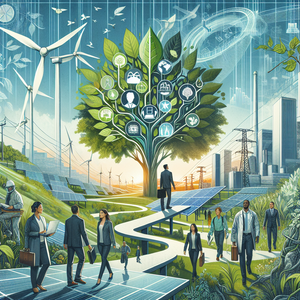The Green Revolution in Economics

The emergence of environmental economics marks a significant evolution in economic thought, addressing the intricate relationship between economic activities and their environmental impacts. Historically, economic models prioritized GDP growth as a measure of prosperity, often sidelining the environmental costs of industrialization and consumption. However, as environmental economist perspectives gain traction, there is a growing recognition of the need to integrate ecological considerations into economic planning. Environmental economics advocates for a balanced approach that harmonizes economic growth with environmental sustainability. By factoring in the costs of environmental degradation and resource depletion, this field challenges conventional economic metrics, promoting a more comprehensive understanding of progress that includes ecological health. This shift is essential as it encourages policymakers and businesses to consider the long-term implications of their decisions on the environment.
Eco-Friendly Policies Reshaping Markets
The influence of environmental economics is most evident in the proliferation of eco-friendly policies that are reshaping global markets. Governments worldwide are adopting regulations and incentives designed to promote sustainable practices. Carbon taxes and emissions trading systems, for instance, are tools being utilized to reduce greenhouse gas emissions and encourage the adoption of cleaner technologies. These policies not only mitigate environmental damage but also unlock new market opportunities in the burgeoning green technology sector, spurring innovation and investment. Businesses, too, are adapting to this shift as consumer demand for eco-friendly products and services rises. Companies that prioritize sustainability are finding themselves at a competitive advantage, while those resistant to change risk falling behind. This trend is apparent across various industries, including energy, transportation, agriculture, and manufacturing, illustrating the profound impact of environmental economics on traditional market dynamics.
Redefining Economic Success
The green revolution in economics is challenging traditional notions of economic success by expanding the criteria beyond GDP growth to include environmental and social dimensions. The concept of "green GDP" is gaining momentum, offering a more nuanced assessment of economic health by accounting for the environmental costs of economic activities. Countries like Bhutan illustrate this shift through their Gross National Happiness (GNH) index, which incorporates environmental conservation as a key component of national progress, prioritizing the well-being of citizens and the environment over mere economic output. Similarly, the United Nations' Sustainable Development Goals (SDGs) highlight the necessity of an integrated development approach that balances economic, social, and environmental objectives.
The green revolution in economics signifies a fundamental rethinking of how we define and pursue economic success. By incorporating environmental considerations into the heart of economic decision-making, this approach presents a sustainable path for growth that aligns with the urgent need to address climate change and ecological degradation. As eco-friendly policies continue to reshape global markets and redefine prosperity, the challenge remains to ensure that this transition is equitable and inclusive, benefiting all segments of society. The green revolution in economics will undoubtedly play a pivotal role in shaping a sustainable future for generations to come, underscoring the importance of this paradigm shift in safeguarding our planet's health and resilience.
Environmental Economist
Government agencies, think tanks, research institutions
Core Responsibilities
Analyze the economic impact of environmental policies and regulations.
Develop models to assess the costs and benefits of sustainability initiatives.
Advise governments and corporations on eco-friendly economic strategies.
Required Skills
Strong analytical and quantitative skills with experience in economic modeling.
Familiarity with environmental regulations and sustainability metrics.
Ability to communicate complex economic concepts to diverse stakeholders.
Sustainability Consultant
Management consulting firms, environmental NGOs, large corporations
Core Responsibilities
Evaluate business operations to identify areas for environmental improvement.
Develop and implement sustainability strategies to reduce carbon footprint.
Conduct sustainability audits and prepare detailed reports.
Required Skills
Expertise in environmental science and corporate sustainability practices.
Strong project management and client relationship skills.
Proficiency in sustainability reporting standards like GRI or CDP.
Renewable Energy Analyst
Energy companies, government agencies, environmental consultancies
Core Responsibilities
Conduct market research and feasibility studies for renewable energy projects.
Analyze energy consumption patterns and propose clean energy solutions.
Monitor trends and advancements in renewable energy technologies.
Required Skills
Background in energy economics or environmental engineering.
Strong analytical and data interpretation abilities.
Knowledge of energy policy and regulatory environments.
Corporate Social Responsibility (CSR) Manager
Large multinational corporations, NGOs, public sector organizations
Core Responsibilities
Develop CSR initiatives that align with company values and enhance brand reputation.
Collaborate with cross-functional teams to integrate sustainability into business operations.
Monitor and report on the progress of CSR projects.
Required Skills
Strong leadership and strategic planning capabilities.
Experience with stakeholder engagement and impact assessment.
Familiarity with sustainability frameworks and reporting tools.
Climate Policy Analyst
Government agencies, international organizations, environmental advocacy groups
Core Responsibilities
Research and analyze climate policies and their economic implications.
Prepare policy briefs and recommendations for government and industry.
Engage with stakeholders to promote climate policy adoption.
Required Skills
Advanced understanding of climate science and policy frameworks.
Strong research and analytical skills with the ability to synthesize complex data.
Excellent written and verbal communication skills.


